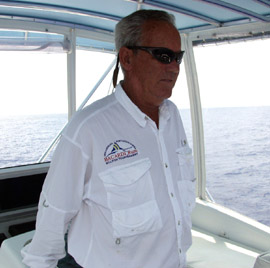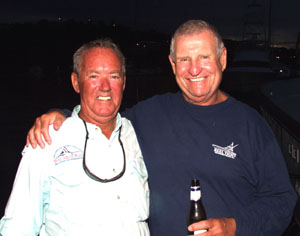 Bermudians call him the 'old man of the sea', a play off the title of Ernest Hemingway's well-known novel. It is true that Capt. Alan Card, a native Bermudian who charters his 40-foot Gamefisherman, Challenger, has fished his island's waters since a kid and professionally for over 35 years. Yet to most folks in the sports fishing world, a better moniker applies to Card. That one is 'legend'.
Bermudians call him the 'old man of the sea', a play off the title of Ernest Hemingway's well-known novel. It is true that Capt. Alan Card, a native Bermudian who charters his 40-foot Gamefisherman, Challenger, has fished his island's waters since a kid and professionally for over 35 years. Yet to most folks in the sports fishing world, a better moniker applies to Card. That one is 'legend'.
Bermuda is fertile grounds for big billfish and Card had led anglers to six of the ten granders caught off the island. "I caught my first grander in 1982. That one was over 1100 pounds and so were the other five."
Interestingly, four of Card's six granders were caught within two days of the full moon.
Size is the unique aspect of Bermuda's billfish fishery. "We're a tiny mountain some 600 miles off the North Carolina coast. We have a shelf similar to the North Drop in St. Thomas, but its 360 degrees around the island and so close you can be fishing within 15 minutes. The waters around here are a natural fish trap for migrating marlin due to the concentration of baits. In fact my son, Ian, who's my mate, caught a 210-pound yellowfin tuna - our island record -in early August."
Card points out that Bermuda sits in the same latitude as another grander hot spot, Madeira Island, off Portugal. He feels that this might influence the size fish seen in Bermuda.
"We really do see more big fish than small," Card says. "For example, the winning fish in this year's Bermuda Big Game Classic was 1023 pounds and the second place fish was 850 pounds."
 Similarly, Bermuda racked up a three-peat this year as the destination that produced the winning fish in the Blue Marlin World Cup Championship. "In addition to the 712 pound winner, we had two other contenders from Bermuda. Unfortunately, none of them were ours," Card says.
Similarly, Bermuda racked up a three-peat this year as the destination that produced the winning fish in the Blue Marlin World Cup Championship. "In addition to the 712 pound winner, we had two other contenders from Bermuda. Unfortunately, none of them were ours," Card says.
Yet, Card did win the World Cup back in 1993 when angler Don Hunt of Bermuda caught an 1195-pounder.
He says, "Its really rare to see blue marlin in the 100 to 150 pound range. Most of them are over 400 pounds."
The high likelihood of catching a grander means that Bermuda's charter fisherman, like Card, use 130-pound test and lures rather than bait. "We don't bait and switch here. Some of the visiting boats do. They tell us that the fish here are really aggressive. They'll hit the teaser and one shot, like an explosion, that's it, they're off and don't come back."
This summer, some 35 to 40 boats visiting from Florida, the Carolinas and Bahamas did fish Bermuda. "We like the coverage we get from the visiting boats. It helps us know when the bite is on and where. Oftentimes there are only 7 to 10 or sometimes only 2 or 3 of the local boats out. It's amazing that for a small number of boats we're able to catch the fish we do," Card says.
Even though peak marlin season is from mid-June through August and sometimes into October, depending on the weather, Card is going to cast off for a few days and fly in to St. Thomas for the USVI Open/Atlantic Blue Marlin Tournament.
"The only time I was in St. Thomas was five years ago on a cruise ship," he says. "I've heard the stories and know many of the crew. I can't wait."
Card adds, "Its an educational trip for me. I want to come down and see the fishing for myself, see how teaser fishing and bait and switch work. We're all self taught here in Bermuda. As charter operators we don't get to experiment much. And, I've not had the opportunity to fish is places other than a trip to the Bahamas. This is a real honor for me to be asked to come to St. Thomas."
Card reflects on his career, "I feel extremely blessed to get those six granders."
 Photo - Friends Card & Lambert.
Photo - Friends Card & Lambert.
Downplaying his skill and years of experience, Card adds, "I figure that since I've fished all these years, sooner or later, I was bound to run into something. But fishing is really about being at the right place, at the right time, with the right tackle, and the right fish. There are no secrets about that."
As for the future of the sport, he says, "We're getting better at catching fish. The equipment is changing and we're more sophisticated in our ability to track fish. So that means we're able to catch more each year. We're conservation minded too, just like in St. Thomas. We take few fish ashore and practice catch and release."
He concludes, "I'd really like to see more young people get into fishing and carry on from us old guys."
